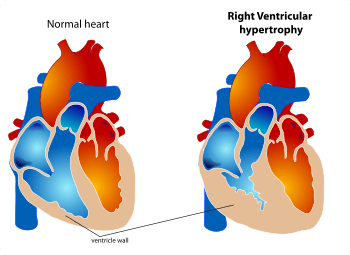Right ventricular hypertrophy
| Right ventricular hypertrophy | |
|---|---|
 | |
| Right Ventricular hypertrophy | |
| Classification and external resources | |
| Specialty | cardiology |
| ICD-10 | I51.7 |
| ICD-9-CM | 429.3 |
| DiseasesDB | 11623 |
| MeSH | D017380 |
Right ventricular hypertrophy (RVH) is a form of ventricular hypertrophy affecting the right ventricle.
Blood travels through the right ventricle to the lungs via the pulmonary arteries. If conditions occur which decrease pulmonary circulation, meaning blood does not flow well from the heart to the lungs, extra stress can be placed on the right ventricle. This can lead to right ventricular hypertrophy.
It can affect ECG findings. An ECG with right ventricular hypertrophy may or may not show a right axis deviation on the graph.[1]
Causes
Common causes include:
- Pulmonary hypertension
- Tetralogy of Fallot
- Pulmonary valve stenosis
- Pulmonic regurgitation
- Ventricular septal defect (VSD)
- High altitude[2]
- Cardiac fibrosis
- Chronic obstructive pulmonary disease (COPD)
- Athletic heart syndrome
ECG findings
General ECG features include:
- Right axis deviation (>90 degrees)
- Tall R-waves in RV leads; deep S-waves in LV leads
- Slight increase in QRS duration
- ST-T changes directed opposite to QRS direction (i.e., wide QRS/T angle)
- May see incomplete RBBB pattern or qR pattern in V1
- Evidence of right atrial enlargement (RAE)
Specific ECG features (assumes normal calibration of 1 mV = 10 mm):
- Any one or more of the following (if QRS duration <0.12 sec):
- Right axis deviation (>90 degrees) in presence of disease capable of causing RVH
- R in aVR > 5 mm, or
- R in aVR > Q in aVR
- Any one of the following in lead V1:
- R/S ratio > 1 and negative T wave
- qR pattern
- R > 6 mm, or S < 2mm, or rSR' with R' >10 mm
Other chest lead criteria:
- R in V1 + S in V5 (or V6) 10 mm
- R/S ratio in V5 or V6 < 1
- R in V5 or V6 < 5 mm
- S in V5 or V6 > 7 mm
ST segment depression and T wave inversion in right precordial leads is usually seen in severe RVH such as in pulmonary stenosis and pulmonary hypertension.
References
- ↑ "Lesson VIII - Ventricular Hypertrophy". Retrieved 2009-01-07.
- ↑ Sect. 4, Ch. 7: Acclimatization to High Altitude